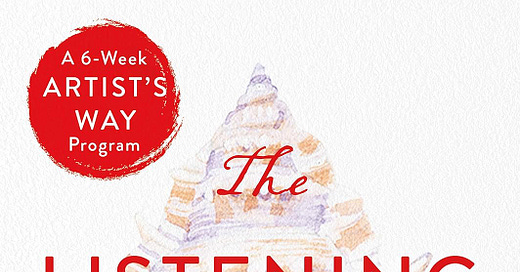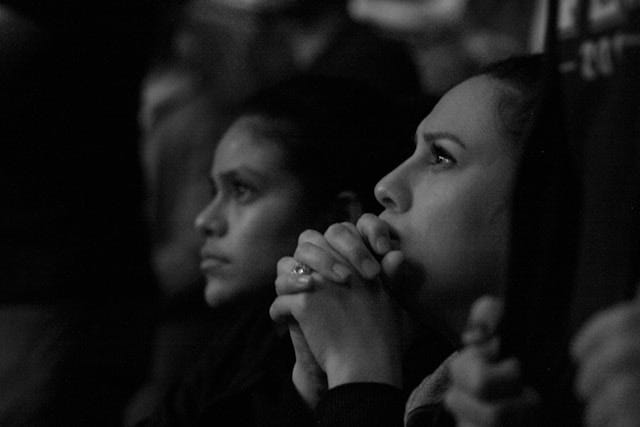On Listening as it Relates to Mental Health and Creativity
I've had to learn to quiet the deluge, silence the automatic responses, and listen to the rest. Listen to my body. Listen to my feelings. Listen to the words only along with the rest of me.
I'm reading The Listening Path by Julia Cameron. Although I have sometimes mixed feelings about her work, I find that I come back to it time and time again. I think it’s partially because it’s useful, partially because it came to me first in a time when I was ripe for the inspiration. I remember being in my twenties, living in a home where I'd added on a tiny third bedroom for my foster children but at the time there wasn't a child in that room. The room was painted sunny yellow and sky blue. I had a journal in similar colors. I would wake up in the morning, make my coffee, and go sit in that room to do my Morning Pages and my Artist's Way exercises. I've never stuck with Morning Pages, and have never actually finished an entire Julia Cameron creative exercises book including The Artist’s Way. But I return. I return. I write in the mornings again. I read another passage from one of the books.
So, right now, I'm meandering my way through The Listening Path which is all about adding deep listening as a component of the creative life.
She talks about all aspects of listening in this book. For example, listening to the environment, which has me thinking about the city sounds around me that I tune out when I could instead opt to tune in, the media sounds I constantly put in my ears when maybe I could listen to silence ...
And of course she discusses listening to others. Truly listening. Listening with your whole mind-body-spirit and not just "hearing" and responding.
I don't think of myself as a great listener. I've definitely gotten better at it over the years. A graduate degree in counseling psychology taught me a lot of the skills necessary to learn how to really listen to others. I'm much better these days than I was twenty years ago at pausing, making space for others without needing to fill the space with words, asking genuine questions and really listening to the answers, hearing the feelings and tones behind the spoken words, not interrupting, not spending the time when someone is talking just thinking about what I'm going to say.
I am better at it. Much better. I am still often terrible at truly listening to others.
The journey to listening to myself has been like that as well. I'm a very wordy person. I once went to an art museum with my artist friend Anna and at some point she asked me, "why do you read the descriptions before you look at the art?" It was a pivotal moment for me in realizing just how truly word-oriented I am. I take in the world, and I share with the world, through words. I just spent the first year of my Visual and Critical Studies Masters Program learning how to look before reading the words although ultimately then I’m still putting words to it.
If you've ever met me in person, you know that I talk a lot. The first time I met my partner’s mother she (fondly, I think) called me a chiacchierona - Italian for chatterbox. She’s not wrong. It’s worse when I’m nervous. Or caffeinated.
So you won't be surprised to learn that there's a constant deluge of words running through my brain at all times. It's not this that I've had to learn to listen to. For better or worse, I listen to that all of the time. Instead, it's what's underneath. I've had to learn to quiet the deluge, silence the automatic responses, and listen to the rest. Listen to my body. Listen to my feelings. Eventually, listen to the words but in conjunction with the rest of me.
I have gotten significantly better at this over the years. I am still often terrible at it.

In The Listening Path, Cameron writes about a conversation with an artist friend named Ezra. Ezra says, "Listening tells me what to do next. I listen and make a piece. I listen again and make another piece." Ezra goes on to say that he's moving to New York because when he's there he has an ongoing conversation with other artists that feeds his art. It got me thinking about how art is, in so many ways, a conversation.
We take in information and then we respond to it through art. We listen to all of the stuff swirling around inside of ourselves and then we express it through art. Hopefully, someone experiences our art and "hears it" and responds in their own way. Art can be a direct conversation between artist and viewer/reader. But it can also be a chatty conversation with lots of voices in lots of different places. Pondering the ways I've learned to listen better over the years, and where I could use more growth, I believe that listening better can make my art better. My writing improves when I don't just immediately respond to each initial thought but instead truly listen, really lean in and open my heart and listen, and only later respond.
But, of course, my ability to listen is directly affected by where I'm at with my mental health. Depression and anxiety make listening so incredibly hard. Depression tells me all kinds of lies and sometimes they are SO loud - lies about myself (I'm not good enough, blah blah blah) and lies about the world (it's dark and hopeless and pointless, blah blah blah.) It dulls the conversation. I can't respond creatively. Anxiety is different, but equally debilitating to my listening skills. My mind is already running with a thousand words per minute; anxiety ramps that up, adds more words, amplifies the volume, and although I'm hearing plenty of stuff inside of my head, I'm not really listening to anything inside or outside of it.
Learning to listen improves my mental health. Learning to listen also helps me have a better artistic conversation through my developing body of work. When my mental health destabilizes, my ability to listen shrinks up, tenses up, squeezes shut. And so my ability to contribute to the conversation gets more challenging. It's an ongoing process. It ebbs and flows. I am a continual work in progress.
Does any of this resonate for you? I hope in "listening" to me, you sometimes find inspiration for your own life experience and creativity.
If you read this far, perhaps you liked the work. The work does take work. It only continues with support, so please consider subscribing. My annual rate starts at $10 per year.









I love this subject. Some people are naturally gifted listeners. My sister was one. You could just tell she heard everything you said.
"So, right now, I'm meandering my way through The Listening Path which is all about adding deep listening as a component of the creative life.
She talks about all aspects of listening in this book. For example, listening to the environment, which has me thinking about the city sounds around me that I tune out when I could instead opt to tune in, the media sounds I constantly put in my ears when maybe I could listen to silence ...
And of course she discusses listening to others. Truly listening. Listening with your whole mind-body-spirit and not just "hearing" and responding."
I never considered how my mental health might influence my ability to listen. Sleep, diet, and exercise must be part of the equation as well. It makes sense that listening in a work setting does depend on how well we can manage our life work balance, how much love, friendship, and fun we can manage.